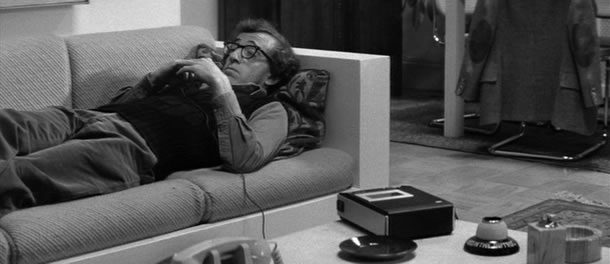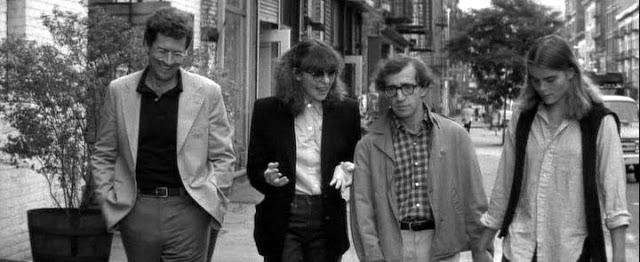Manhattan
Directed by Woody Allen
Written by Woody Allen and Marshall Brickman
USA, 1979
People are constantly creating problems for themselves, problems that have to be solved and even some that can’t be solved. I’m no stranger to this self-destructive behavior. I made a list of classic films that I had never seen – that I should have seen – a shame list, literally shaming myself for my shortcomings. Completing this list isn’t too hard a task but nonetheless gives me a good incentive to watch the classics that I’ve ignored for years. Ironically, Woody Allen’s Manhattan is one of the films on The Shame List, and this neurotic tendency to create problems is the very premise of the film. For the eccentric characters in Manhattan, creating unnecessary, distracting problems serves as a way to avoid dealing with the more terrifyingly unsolvable problems of the world.
At its core, Manhattan is a film about relationships, broken and failed relationships. Focusing on Isaac Davis (Wood Allen), the film follows his attempts to write his first serious novel. At the same time, Isaac is having an affair with a seventeen year old high school girl named Tracy (Mariel Hemingway). Similarly, Isaac’s best friend, Yale (Michael Murphy), is having an affair with Mary Wilke (Diane Keaton), a condescending journalist. In the hopes of saving his marriage, Yale ends his affair with Mary and suggests that Isaac ask her out. With Yale’s encouragement, Isaac begins dating Mary, discarding the impressionable young Tracy in the process. Keeping with the cruel irony of human desire, Yale soon realizes that he wants Mary back, and a lonely Isaac tries in vain to win Tracy back before she leaves for London.
As with all Woody Allen characters, Isaac, Yale, and Mary are all very well-educated and that certainly comes across in their nervous verbosity, but their shared problem is that they have little understanding of real life or themselves. Allen depicts this in his characters’ many failed relationships. Because of their selfishness and naïve desires, their awkward relationships only become more convoluted as the film goes on. The characters in Manhattan and the film itself make a number of false starts, false starts in relationships and false starts in Isaac’s opening narration. Notably, the opening sequence with Isaac dictating the beginning of his novel introduces the themes of the film with each revised attempt. Isaac either over-romanticizes everything from New York City to women or convinces himself of his own knowledge and certainty of New York, of the universe.
For Allen’s Isaac, the question remains why life is worth living. For Isaac life is worth living because of “Groucho Marx; Willie Mays; the second movement of the Jupiter Symphony; Louis Armstrong’s recording of Potato-head Blues; Swedish movies, naturally; Sentimental Education by Flaubert; Marlon Brando; Frank Sinatra; those incredible apples and pears by Cézanne; the crabs at Sam Wo’s; and Tracy’s face.” Isaac’s list is telling for many reasons but specifically because everything but the last item is a work of art or cuisine or people – Brando and Sinatra – who have been made into artistic icons. This points to a central problem for the characters in Manhattan. They are constantly equating art and people, treating people as objects, and turning objects into works of art. New York itself is first introduced as “a town that existed in black and white and pulsated to the great tunes of George Gershwin,” essentially a work of art, a black and white movie, this movie. In this context, Tracy’s final line becomes all the more important: You have to have a little faith in people. In other words, Isaac should treat people as people, laugh with them, and share their concerns rather than objectify them. People shouldn’t be treated as objects, not even objets d’art.
In an interview with The Guardian, Woody Allen once said, “I feel the only way you can get through life is distraction. And you can distract yourself in a million different ways, from turning on the television set and seeing who wins the meaningless soccer game, to going to the movies or listening to music. They’re tricks that I’ve done and that many people do. You create problems in your life and it seems to the outside observer that you are self-destructive and it’s foolish. But you’re creating them because they’re not mortal problems. They are problems that can be solved, or they can’t be solved, and they’re a little painful, perhaps, but they are not going to take your life away.” This is the essence of Manhattan. Allen’s characters distract themselves with convoluted personal relationships.
– Katherine Springer



